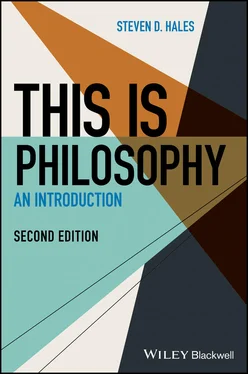Now, you might suggest at this point that even if God does not make morality, nevertheless the smart move is to pay attention to his moral advice. God is supposedly morally perfect, so as an ethical role model, there’s no one better. Since morality is a hard thing to figure out, if God’s got it all solved for us, we should listen up–scripture’s just Ethics for Dummies 7.
While this is certainly an approach we might try, as a practical matter it is not exactly smooth sailing. Here’s what we’ll need to do. Step one: prove that a perfectly good God exists. Step two: prove that there are no other Gods whose moral opinions we must also consult. That is, not only is your religion right but also everyone else’s is also wrong. Step three: show how we can know what God’s moral views are. If you think that the Qur’an, the Bible, the Torah, the Upanishads, or whatever are the word of the Lord, you’ll need to prove that. Or if you believe you have God’s cell phone number, and he’s letting you know what he thinks, you’ll need to show why you’re not just delusional instead. Step four: offer a clear and unequivocal interpretation of God’s moral views. We might be able to pull off all these things. But each of the steps is mighty heavy lifting. If Plato is right, and morality and religion are logically independent, then we can investigate ethics without debating religion. Perhaps the smart practical move is to do that very thing.
1.3 Egoism (Is Morality Just My Own Personal Code?)
Maybe morality is just a matter of each individual’s personal ethical views, along the lines of the following sentiments:
Morality is just whatever you believe it is.
Everyone has their own morality.
Real morality is just “look out for #1.”
Here’s the real Golden Rule: he who has the gold makes the rules.
“What is moral is what you feel good after and what is immoral is what you feel bad after8” (Ernest Hemingway).
“Man’s greatest good fortune is to chase and defeat his enemy, seize his total possessions, leave his married women weeping and wailing, ride his gelding, use the bodies of his women as a nightshirt and a support, gazing upon and kissing their rosy breasts, sucking their lips which are sweet as the berries of their breasts” (Genghis Khan).
“What is best in life is to crush your enemies, see them driven before you, and to hear the lamentation of their women9” (Conan the Barbarian).
“The achievement of his own happiness is man’s highest moral purpose10” (Ayn Rand).
There are two distinct ideas expressed by these slogans, and we should pry them apart. One is a purely descriptive thesis about human psychology, namely:
Psychological egoism: everyone always acts in their own self-interest.
The other idea is a normative thesis about morality, namely
Ethical egoism: everyone should always act in their own self-interest.
Both of these theses could be true. Obviously, if psychological egoism is true, then fulfilling one’s moral duties according to ethical egoism is a piece of cake. It’s easy to do what you can’t avoid doing anyway. Or it could be that psychological egoism is true and ethical egoism is false, in which case everyone acts selfishly, but that’s just evidence of flawed human beings who must struggle against their nature to do the right thing. Or perhaps ethical egoism is true but psychological egoism is false, in which case everyone ought to just look out for themselves, but misguided social pressure forces us to sacrifice for others. Or perhaps both psychological and ethical egoism are false.
Let’s take a look at these two in turn. First up is a popular argument for psychological egoism, namely that altruism is always merely superficial and the authentic springs of actions are invariably self-interested ones. The idea is that even people who sacrifice for others, donate to charity, feed the poor, etc. only do so because it makes them feel good about themselves, or impresses others. Nobody would help other people if they didn’t get something in return–self-satisfaction, self-esteem, community respect, higher social standing, better choice of mates. On the surface charity looks like altruism, but when we dig a little deeper we can see that it is self-interest after all. Sometimes “altruism” is obviously selfish, as in the case of someone who tithes to the church or gives alms to the poor in order to get a quick pass into heaven. No matter what you do, you get something out of it, or you wouldn’t be doing it. Which is just to say that everyone always acts in their self-interest; we just can’t help it.
Without question, sometimes people behave in psychologically egoistic ways, and apparent altruism is just virtue signaling in disguise. But does human behavior always follow this pattern? Let’s investigate what would count as evidence that at least sometimes people are genuinely altruistic, and that therefore psychological egoism is false.
Consider an act of putative self-sacrifice, in which Generous George gives away a considerable amount of money to a needy stranger. The psychological egoist is committed not only to the view that George stands to benefit in some way (for example, by feeling good about himself) but his benefit outweighs the cost of getting it. Otherwise, it is a net loss for George. Put another way, one can’t reasonably argue that Saleswoman Sarah is a smart car dealer if she keeps selling cars for less than the dealership paid for them. Losing money is not self-interested behavior. She acts in her self-interest only if she’s making a profit and selling cars for more than her company paid for them. Likewise Generous George isn’t acting in his self-interest if what he’s getting out of his charity is less valuable than the money he’s giving away.
Here, then, is a test for egoistic action: An action is egoistic only if the benefits to the giver exceed the cost of the giving . Put conversely, if the benefits to the giver are less than the value of the gift, then the action is not egoistic. Now that we know in principle how to refute psychological egoism, are there any real-life, actual cases of non-egoistic behavior? The answer is yes.
Ross McGinnis was a 19-year-old Army private from Pennsylvania serving in the Iraq War. One December day he was manning an M2 .50-caliber machine gun in the turret of a Humvee patrolling Baghdad’s Adhamiyah district. A rooftop enemy insurgent lobbed a fragmentation grenade at the Humvee, which fell through the gunner’s hatch and landed near McGinnis. He immediately yelled, “the grenade is in the truck” and threw himself on it. His quick action allowed all four members of his crew to prepare for the blast. According to the Army, “ McGinnis absorbed all lethal fragments and the concussive effects of the grenade with his own body 11.” He was killed instantly. His platoon sergeant later stated that McGinnis could have jumped from the Humvee to safety; instead he chose to save the lives of four other men at the sacrifice of his own. For his bravery McGinnis was posthumously awarded the Medal of Honor.
McGinnis certainly did not act in his own self-interest. He received no benefit at all from his heroism, and even the Medal of Honor is cold comfort to his grieving family, who would have much preferred the safe return of their son. It is an understatement to observe that the value of his gift–saving the lives of four fellow soldiers–was greater than what he got in return, which was merely death.
You might be inclined to argue that McGinnis is a rare exception, and that heroic self-sacrifice is far from the norm. Maybe psychological egoism isn’t true of every human being ever to live, but it could still be true of the vast majority. You might think that nearly everyone always acts in their own self-interest. Yet even this modified claim of predominant egoism is apparently false.
Читать дальше












